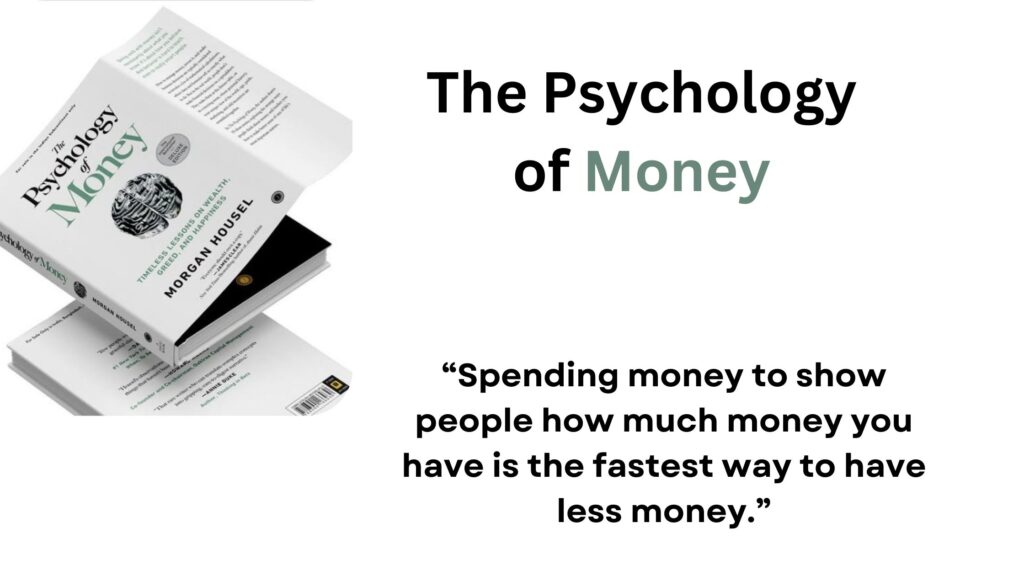
“Saving is the gap between your ego and your income.” What a hard-hitting yet simple line!
I’ve read many books about money during my younger years—Rich Dad Poor Dad, Think and Grow Rich, and many more. Most of them had a common theme: strategies, tricks, and aggressive approaches to getting rich. But when I read The Psychology of Money by Morgan Housel, I realized it was different.
This book doesn’t promise shortcuts to wealth or quick success. Instead, it focuses on how we think about money, our habits, and the psychology behind financial decisions. It’s not just about earning or investing—it’s about understanding why people handle money the way they do.
In this post, let’s dive into the key lessons from this book. Hopefully, by the end, you’ll gain a new perspective on wealth that goes beyond just numbers. Let’s get started!
Why This Book Is Different
This book is for everyone—whether you’re a business-minded person or a regular employee. Unlike many other finance books, The Psychology of Money doesn’t push aggressive investment strategies or promise secret tricks to get rich quickly.
Instead, it takes a practical and realistic approach. It explores:
Your habits with money – how you think about wealth and financial decisions.
The importance of savings and investments – without chasing risky shortcuts.
The balance between growing wealth and enjoying it – because money isn’t just about accumulating, but also about using it wisely.
In simple terms, this book is easy to understand yet deeply insightful. It explains financial principles in a way that actually makes sense—helping you develop a healthy, long-term approach to money.
Key Lessons and Insights
Morgan Housel’s book doesn’t give you complex financial formulas—it shifts your mindset about money. It’s not about how much you earn, but how you think about money that defines your financial success. Here are some key takeaways that will make you rethink wealth:
📌 1. Wealth is Built in Silence, Not in Display
- People often associate wealth with expensive cars, designer brands, and luxury lifestyles. But real wealth is what you don’t see—it’s the money sitting in investments, savings, and assets that quietly grow over time.
- Lesson: If you’re always spending to look rich, you may never actually be rich.
📌 2. The Game of Money is Personal—Define Your Own Goals
- Not everyone needs to be a millionaire. Some people seek financial security, others want freedom, and some just want enough to enjoy life without stress.
- Lesson: Don’t play someone else’s money game. Set your own definition of success.
📌 3. Savings is Your Superpower—Not Just for Emergencies
- Many think of saving as just an emergency fund, but saving gives you options—freedom to quit a bad job, take a career break, or invest when opportunities arise.
- Lesson: Save, not just for security, but for flexibility and control over your life.
📌 4. Patience Pays More Than Any Investment Strategy
- Warren Buffett isn’t rich because he found secret investments—he just stayed invested for over 80 years.
- Lesson: The longer your money stays in the game, the bigger the reward. Wealth grows when given time.
📌 5. Enough is a Superpower—Know When to Stop Chasing
- Some people keep risking everything to earn more, only to lose it all. The greed for “just a little more” can be dangerous.
- Lesson: Understanding when you have “enough” prevents unnecessary risk and stress.
📌 6. Luck and Risk: The Unseen Forces Behind Success
- Two people may work equally hard, but one gets an early break while the other faces setbacks. Success is never just effort—it’s also about timing, luck, and circumstances.
- Lesson: Stay humble in success, and don’t judge failures too harshly.
📌 7. The Goal Isn’t More Money, It’s More Freedom
- True wealth isn’t just a number in your bank account—it’s having control over your time.
- Lesson: The best financial goal is to earn in a way that lets you live on your terms.
Final Thought
Money isn’t just math—it’s psychology, habits, and emotions. The Psychology of Money makes you realize that financial success isn’t about luck or intelligence, but about behavior and mindset. When you change how you think about money, you change how you handle it.
Why You Should Read It
This book is simple, easy to read, and highly relatable. If you’ve never read a finance book before, The Psychology of Money is the perfect place to start. It doesn’t overwhelm you with complex theories—instead, it focuses on real-life money habits and decisions that anyone can understand.
I’m sure you’ll enjoy this book because it speaks to everyone, no matter their background. It’s not just about money—it’s about how we think, act, and make choices that shape our financial future.
A Fun Fact About My Experience with This Book
I first discovered The Psychology of Money through a YouTube recommendation from Ankur Warikoo’s video. It caught my interest, and after reading it once, I found it so valuable that I re-read it twice!
I was so impressed by the book that I even gifted it to 3-4 people, and their feedback was amazing. Some of them even called me personally to share how much they loved it. That’s when I realized—this book truly resonates with everyone!